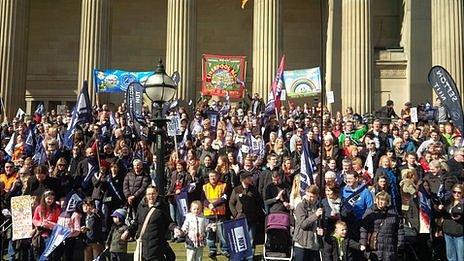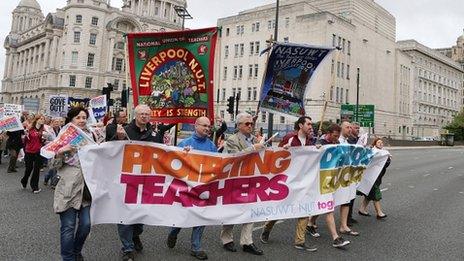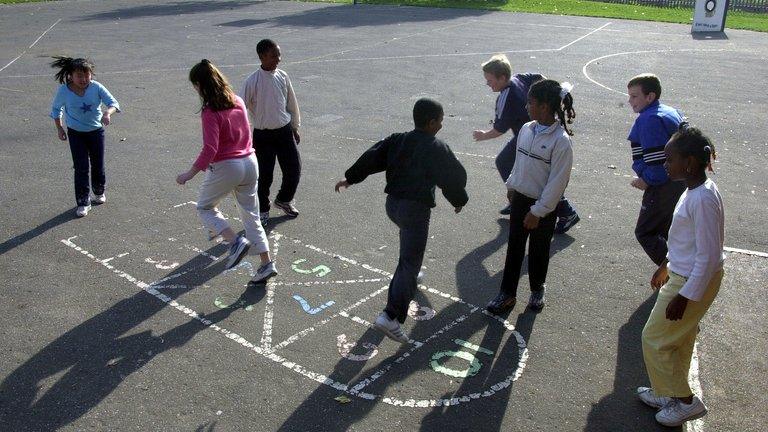Why teachers are on strike
- Published

NUT members are angry at changes to pay, pensions and working conditions
As members of the National Union of Teachers (NUT) across England and Wales strike over pay, pensions and conditions, the BBC News website looks at the backdrop to the industrial dispute.
Why are teachers striking?
Members of the NUT are taking industrial action over performance-related pay, pension changes and what it calls, excessive workload and bureaucracy.
The union says teachers are concerned about the impact these imposed changes are having on:
the morale of the profession
the recruitment and retention of teachers
the provision of quality education
The main concern is the introduction of a tougher version of performance-related pay and what the unions say is an attack on national pay structures.
The union said Wednesday's strike action was covered by two ballots held in May 2011 and June 2012. The turnout for the ballot was 40% of the NUT's 326,930-strong membership and 92% of these voting members were in favour of strike action.
How widespread is the action?
This latest walkout is having an impact on schools in England and Wales. Scotland and Northern Ireland are not affected.
The Department for Education, which is responsible for schools in England only, says officials are trying to determine the number of schools affected by the strike but that the process is "very labour-intensive".
An official said "well under a quarter" of the 24,330 schools in England were closed, compared with about 60% during the bigger of the two national strikes in 2011.
The BBC understands there are 472 partial closures and 297 full closures in Wales, out of a total of more than 1,700 schools.
Haven't teachers taken a lot of industrial action lately?
Wednesday's action is the third national walkout since 2011 over pay, pensions and conditions. There have also been regional strikes.
On 30 June 2011, four teachers' unions held a national day of action.
On 30 November 2011 these unions, together with other public-sector workers, staged a one-day stoppage over concerns about pensions.
A London-only NUT strike was held on 28 March 2012 over pensions.
Regional strikes by the NUT and NASUWT over pay, pensions and conditions were held on 27 June, 1 October and 17 October 2013.
A proposed one-day national walkout in November by the NUT and the NASUWT was called off after a return to negotiations with the government.
Why is the NASUWT not involved this time?
The NASUWT, which had previously taken joint action with the NUT, announced on 14 February that it would not take strike action on this occasion.
The union said Education Secretary Michael Gove's acceptance of recommendations made in the latest report by the School Teachers' Review Body ensures "important contractual entitlements of teachers are maintained".
The NASUWT also said Mr Gove's commitment to meet with them on a weekly basis to discuss their concerns was another reason not to stage strike action.
What does the government say?
The Department for Education says the unions are striking over the government's measures to allow heads to pay good teachers more.
This refers to the performance-related pay structures introduced in September 2013, under which teachers will only progress up pay scales if they meet certain standards.
It says any industrial action disrupts pupils' education, inconveniences parents and damages the profession's reputation in the eyes of the public.
- Published26 March 2014

- Published1 October 2013

- Published5 September 2013

- Published12 July 2013
